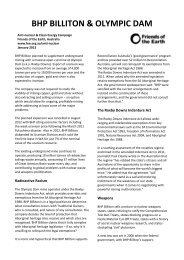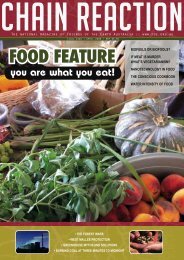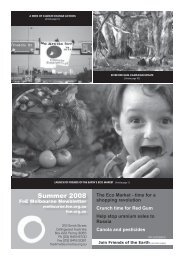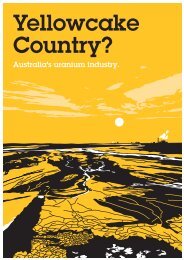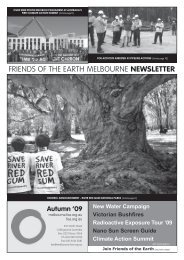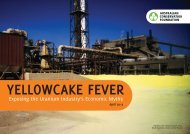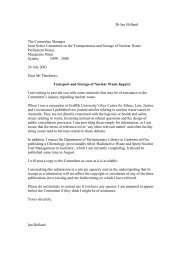Thirty Years of Creative Resistance - Friends of the Earth Australia
Thirty Years of Creative Resistance - Friends of the Earth Australia
Thirty Years of Creative Resistance - Friends of the Earth Australia
You also want an ePaper? Increase the reach of your titles
YUMPU automatically turns print PDFs into web optimized ePapers that Google loves.
FoE International meeting in Melbourne,<br />
bringing a diverse cross section <strong>of</strong> <strong>the</strong><br />
global network to <strong>the</strong> country for <strong>the</strong> first<br />
time.<br />
FoE was one <strong>of</strong> <strong>the</strong> first environmental<br />
networks to become active in Eastern<br />
Europe. Its first member group in <strong>the</strong> East<br />
was Poland’s Polski Klub Ekologiczny,<br />
which joined FoEI in 1985. In <strong>the</strong> mid<br />
and later part <strong>of</strong> <strong>the</strong> 1990s, FoE grew<br />
rapidly throughout Latin America and in<br />
2004 is now building its membership base<br />
throughout Asia.<br />
FoEI is currently <strong>the</strong> largest grassroots<br />
environment NGO Federation in <strong>the</strong> world<br />
with member groups in 68 countries.<br />
Around half <strong>of</strong> <strong>the</strong>se are in <strong>the</strong> ‘South’<br />
or majority world (formerly called <strong>the</strong><br />
third world). FoEI has a democratic<br />
and decentralised structure, which is<br />
unique amongst <strong>the</strong> large international<br />
environmental groups, and <strong>the</strong> network<br />
embraces social as well as nature<br />
conservation issues. FoE represents <strong>the</strong><br />
political reality <strong>of</strong> life in <strong>the</strong> South ra<strong>the</strong>r<br />
than just quality <strong>of</strong> life and biodiversity<br />
issues in <strong>the</strong> ‘developed’ world. An external<br />
review <strong>of</strong> FoEI in 1998 identified three<br />
...................................................................................................................................................................................................<br />
FoE International meeting, Quito, Ecuador, 1999.<br />
‘streams’ <strong>of</strong> thought within <strong>the</strong> Federation:<br />
nature conservation; eco-efficiency; and<br />
environmental justice. Recent years<br />
have seen a clear shift towards this third<br />
approach, with a growing emphasis on a<br />
‘social ecology’ perspective.<br />
Because <strong>of</strong> its political view, FoEI does<br />
not establish <strong>of</strong>fices in countries in order<br />
to expand its network. Instead it seeks<br />
existing partners who meet certain criteria<br />
in those countries where <strong>the</strong>re is currently<br />
no FoE member group. All <strong>of</strong> FoEI’s 68<br />
member groups have been established<br />
locally ra<strong>the</strong>r than simply being a branch<br />
or <strong>of</strong>fice established by an external<br />
organisation. As a result, <strong>the</strong> Federation is<br />
remarkably diverse.<br />
To be eligible to join FoEI, a potential<br />
group must be a national group (only<br />
one member is allowed per country); be<br />
working on <strong>the</strong> key environmental issues<br />
in that country; have democratic, nonracist<br />
and non-sexist structures; and be<br />
independent from political parties and<br />
o<strong>the</strong>r affiliations.<br />
The political structure <strong>of</strong> FoEI is based on<br />
democratic principles. All national groups<br />
FoE 30 <strong>Years</strong> 131



